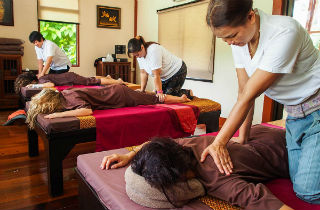By Colin Hinshelwood
CHIANG MAI, Thailand (August 7, 2018)
Many think of Thailand as a playground for parties and drugs, not as a place to get away from hedonistic pleasures. But in recent years, the Buddhist kingdom has established a reputation as a retreat for those seeking treatment for addictions. Several sanctuaries are now catering to foreign guests, offering first-class professional treatment and five-star facilities.
But why are clients from as far afield as the Americas, the Middle East and Europe choosing to travel to Thailand when they must surely have adequate facilities closer to home?
1. Medical reputation
The emergence of Thailand as a rehab hub should come as no surprise to observers of the Thai medical tourism sector over the years. Thailand established itself in the 1980s and 90s as an economical option for medical procedures – from heart surgery to sex changes, from dentistry to hip replacements. Apart from the country’s appeal as an exotic location, its hospitals are seen as safe and thorough, and use state-of-the-art technology.
Of the more than 30 million tourists to Thailand every year, it is estimated that well over 500,000 visit specifically for a medical procedure. Many are Americans, faced with unaffordable bills at home. Thailand now has 42 medical centers that have been awarded Joint Commission International (JCI) certification, globally recognized as the gold standard in healthcare. Bangkok Hospital has an entire wing reserved for Japanese patients, while the renowned Bumrungrad Hospital – popular with Middle Easterners – provides each of its staff with an orientation course in Islam. Over half of Bumrungrad’s 1,200 doctors have international training and/or certification.
2. Holistic Programs
As a devout Buddhist country, Thailand has a culture rich in holistic practices. The Dawn Medical Rehab and Wellness Center, which is located in a serene and lush riverside property near Chiang Mai in Northern Thailand, offers clients a daily itinerary that includes Buddhist meditation, Thai massage, yoga, fitness training and Thai boxing. Meals are splendid buffet feasts of fresh local fruit, organic vegetables and a selection of Thai, Asian and European cuisines.
“We want our clients to experience the Thai-ness of the retreat, the tranquillity of a Buddhist temple, and the benefits of a health farm,” said The Dawn founder Ohm Poolsawaddi. “It’s more like a Thai resort, but with Western doctors, counselors and psychiatrists on hand 24-7.”
3. Far from the Familiar
When recovering from addiction, it is imperative that you are not constantly tempted by the triggers that set you off, be it friends with similar habits, local drinking dens or access to drug dealers. As Dawn counselor Dylan Kerr says: “Different playground, different friends.”
Formerly a heroin and crack user, Simon Mott says he lost 20 years of his life to addiction in London. Mott has since turned the tables and is now co-founder of the Hope Rehab Center about 120 kilometres south of Bangkok. “Given the choice of staying in a familiar environment surrounded by all your old problems or escaping on an exotic adventure to Thailand, well it’s a no-brainer for most people looking for help,” he said.
4. Climate/ environment
A dreary dark winter can be a fatal trigger to those with depression and addiction issues. In countries such as Sweden and Finland, a lack of sunlight is attributed to many suicides. Thailand, on the other hand, offers warm tropical weather. On the southern island of Phuket, clients can enjoy dreamy beaches with sapphire waters close to the Miracles Asia rehab facility. Hope Rehab offers its customers weekend visits to the island of Koh Chang. In the north, The Dawn is nestled against a backdrop of rice paddies, orchards and mountainous rainforest.
5. Hospitality
Nicknamed “The Land of Smiles,” Thailand is famed for its friendly and welcoming people. “There was a familiar feeling that I couldn’t identify at first, but then realized it was the feeling of being totally cared for and supported both emotionally and physically in a way that I hadn’t experienced since childhood,” wrote British clinical hypnotherapist Lesley Lyle in her recent article Is Rehab the Perfect Sanctuary? Lyle had spent one week at The Dawn undertaking an Executive Burnout programme , which is aimed at professionals suffering from overwork and pressure. “I was in fully in touch with nature, disconnected from technology, the internet, email and TV. Immersed in a world where I was able just to be,” she said.
6. Confidentiality
Understandably, most clients who enroll in a course at a rehab center do not want their family, friends or employers to know. “Being able to tell everyone that you are going on vacation to Thailand for a month is a great advantage for those who are keen to keep the purpose of their trip confidential,” says Happiness and Wellbeing Specialist Lesley Lyle. Of course, after successfully detoxing at a rehab, many guests will take a tour of the highlands and rainforest in Northern Thailand or head for a hammock overlooking a tropical beach in the south, where they can reflect, relax and recover.
7. Easy Visas
Tourist visas for Thailand can be acquired quickly and cheaply at embassies around the world. Patients or medical visitors from neighboring nations and China qualify for special 90-day visas, while seniors from 14 Western countries can now consider a 10-year visa. Simply put, the Thais are keen on welcoming retirees and medical tourists.
8. Cost
Treatment in Thailand is generally 70 percent cheaper than in the USA. Thai rehabs and wellness centers are similarly economical. The Dawn, Hope, Miracles Asia and other rehabs across the country all price at about a third to a quarter of a similar rated facility in Europe, Australia or USA.
Recommended destination rehabs in Thailand:
- The Dawn Medical Rehab & Wellness Center
- Hope Rehab Thailand
- Miracles Asia
- DARA Rehab









Related Posts